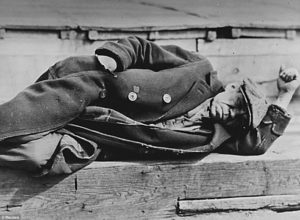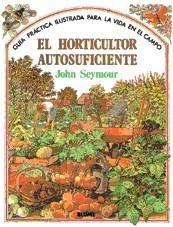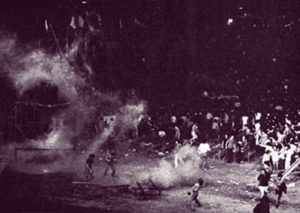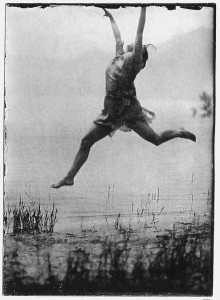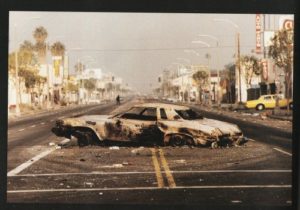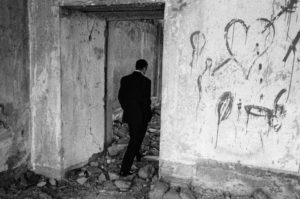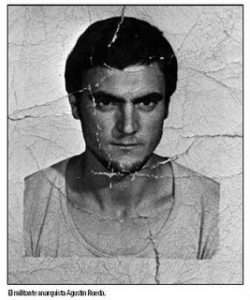Roma, 7 Gennaio del 1978, ore 18,20: cinque militanti del Fronte della Gioventù escono dalla sede dell’Msi di via Acca Larentia 28, nel quartiere Appio Latino, lasciando un biglietto sul tavolo “Siamo a Prati, ci vediamo domani”.
Acca Larentia è tristemente famosa in quegli anni, per i numerosi attacchi squadristi che troppe volte sono partiti proprio da quella sede.
Continue reading 7 gennaio 1978: Accalarentia
Tag Archives: 1978
Tal para cual. Reseña y reflexiones sobre “Colpo su colpo”, acerca de la acción del compañero Émile Henry.
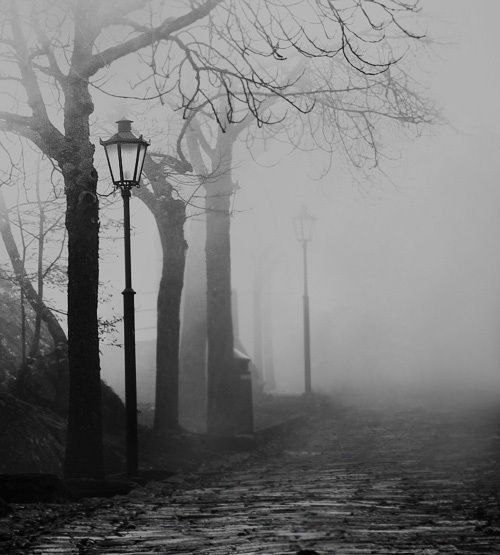
Artículo aparecido en la revista Anarchismo número 23-24 (1978) que analiza el libro “Colpo su colpo”, editado por Edizioni Vulcano el mismo año.
Una colección contiene una biografía de Henry, dos de sus cartas, el reporte del proceso, algunos aforismos, y un apéndice con una interesante carta de Malatesta y una inútil correspondencia tomada de “Le Petit Journal”.
El volumen, hay que decirlo, presenta un problema que supera de gran manera los estúpidos logros tanto de los historiadores clásicos como de los historiadores del anarquismo: el gesto de Henry fue algo que miedo, fue algo que sacudió no sólo a la llamada “opinión pública”, sino que también a los compañeros. Y la carta de Malatesta, inserta en el apéndice, es un ejemplo de esta perplejidad tomada por el anarquista italiano y justificada, en cierto modo, poniendo por delante la usual cautela, la misma que pocos años antes había hecho gritar “provocador” a gente como Grave o como Kropotkin en las confrontaciones sobre Ravachol.
Continue reading Tal para cual. Reseña y reflexiones sobre “Colpo su colpo”, acerca de la acción del compañero Émile Henry.
AZIONE RIVOLUZIONARIA – volantino distribuito a Carrara, 1978
Testo del volantino distribuito a Carrara nel corso del terzo congresso delle Federazioni Anarchiche tenutosi nei giorni 23-26 marzo 1978
Che fare?
Lanciamo un appello a tutti quei compagni anarchici, convenuti a questo ennesimo congresso, non ancora scientizzati e invecchiati anzitempo dal continuo e faticoso compito di calcare le scene, chi in veste di attore, chi di spettatore delle rappresentazioni assembleari e congressuali e a quei compagni che non abbiano già devoluto tutto il loro spirito e le loro energie rivoluzionarie ad una pratica che fa dell’attesa e della difesa le sue principali prerogative. E’ appunto qui a Carrara, così come a Venezia (al convegno sulla tenocrazia), che si vogliono rinverdire i vecchi rami della confusione, dell’incapacità e della staticità del movimento. Si vorrà vedere con chiarezza, si vorrà comprendere con vero ardore.
Continue reading AZIONE RIVOLUZIONARIA – volantino distribuito a Carrara, 1978
1978 THE POLICE AND JUDICIARY OF THE HISTORIC COMPROMISE INCRIMINATE A NINETEENTH CENTURY CLASSIC
While the criminals responsible for the destruction of Seveso freely continue to destroy the lives of thousands of proletarians
While those responsible for the Lockheed scandal are tranquilly carrying on governing and organising swindles
While the Andreotti/Berlinguer government pillages the low wages of the exploited and forces millions of them into unemployment and emargination
Continue reading 1978 THE POLICE AND JUDICIARY OF THE HISTORIC COMPROMISE INCRIMINATE A NINETEENTH CENTURY CLASSIC
Libro para descargar : “El horticultor autosuficiente” (John Seymour)
El mítico libro de John Seimour, “El horticultor autosuficiente”, ¡¡disponible para descarga directa!! (en formato pdf). La edición original es de 1978 (ya ha llovido…),
Continue reading Libro para descargar : “El horticultor autosuficiente” (John Seymour)
28 Febbraio 1978: l’assassinio di Roberto Scialabba. Non dimentichiamo, non perdoniamo
Il 28 febbraio 1978 i fascisti dei NAR assassinano Roberto Scialabba, militante comunista.
Un mese e mezzo dopo la strage di Acca Larentia un gruppo di neofascisti si presenta a Cinecittà alla caccia dei compagni.
Continue reading 28 Febbraio 1978: l’assassinio di Roberto Scialabba. Non dimentichiamo, non perdoniamo
Lightening Conductors and Stand-ins
Anarchismo Collective
“The cleavage of men into actor and spectators is the central fact of our time. We are obsessed with heroes who live for us and whom we punish. If all the radios and televisions were deprived of their sources of power, all books and …. One is spectacle. Like the Phantasmagoria, its goal is the creation of a total …” (Jim Morrison).
Continue reading Lightening Conductors and Stand-ins
ANTI-INSTITUTIONAL MOVEMENT, REVOLUTIONARY VIOLENCE, ARMED STRUGGLE. SOME REFLECTIONS.
From ‘Armed Struggle in Italy 1976-78’ Elephant Editions
In order to dispel any ambiguity which might arise, I should like to make it clear that when I speak of armed struggle I am not basing myself on artificial divisions imposed by bourgeois laws where the throwing of dozens of molotov cocktails runs the risk of not being considered a situation of armed struggle by some comrades.
It is not the technical instrument we use that qualifies an action as violent or not, but rather its perspective in the confrontation with the class enemy. To employ armed struggle means essentially to be ready to respond to State violence and exploitation blow for blow at every level.
Continue reading ANTI-INSTITUTIONAL MOVEMENT, REVOLUTIONARY VIOLENCE, ARMED STRUGGLE. SOME REFLECTIONS.
OUR ROLE IN THE PRESENT CONFLICT
We see the present historical situation as one that is characterised by a state of increasing illegality in which vast strata of society find themselves. Millions of unemployed young people and those on the margins of society are having to use what ever means are available in order to survive: thousands of women are obliged to have back street abortions; workers are practicing individual forms of sabotage, absenteeism and production boycotts; there are those in the system’s concentration camps (special prisons, psychiatric hospitals etc.) who are rebelling; proletarian squatters have not paid rent for years; ethnic communities are reaffirming their identities; ‘hooligans’ are crowding metropolitan ghettos; and many others.
Continue reading OUR ROLE IN THE PRESENT CONFLICT
Agustín Rueda, preso anarquista asesinado en la cárcel en 1978
Nació el 14 de noviembre de 1952 en una barraca de la Colonia de Sallent, pueblo minero con importante porcentaje de inmigrantes. Madre tejedora y padre minero que, con el drama de la miseria habitual de la época, no conseguirán algo semejante a un piso hasta el año 1956, “concedido” por la empresa. Esta Colonia donde nace será objeto de reflexión constante a lo largo de su vida; su pensamiento remitió a ella en todo momento. Acude a la escuela -otro hito- hasta el 8 de junio de 1966 en que finalizados los estudios primarios topa con su condición de hombre pobre: ha de conseguir trabajo. Cuatro años de aprendiz de matricero en una empresa auxiliar del automóvil a ocho kilómetros de la colonia. Es fácil adivinar los componentes del cuadro que le llevan a tener ya en esos momentos una conciencia inicial de explotado.
Continue reading Agustín Rueda, preso anarquista asesinado en la cárcel en 1978
